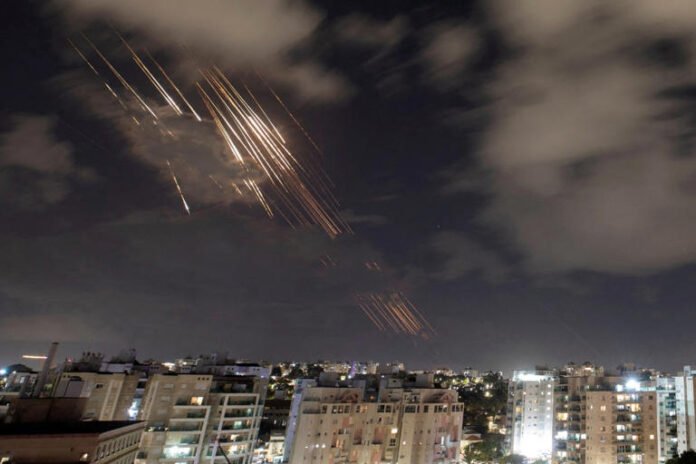Israel and its allies recently faced an unprecedented missile attack launched by Iran. The attack, which saw a barrage of advanced missiles and drones targeting critical infrastructure, was met with a robust defense system that boasted a staggering 90% interception accuracy. This incident highlights the increasing sophistication of missile warfare in the Middle East and the strategic importance of missile defense systems in maintaining regional stability.
The Escalating Tensions
The missile attack comes amid a period of heightened tensions between Iran and Israel, fueled by geopolitical rivalries, proxy conflicts, and differing ambitions across the Middle East. Iran, with its ballistic missile capabilities, has long been a source of concern for Israel and its Western allies. Tehran has bolstered its missile program as part of its broader defense strategy, making it one of the most formidable missile forces in the region.
While sporadic exchanges of fire have occurred between Israel and Iranian-backed groups in Syria and Lebanon over the years, this latest attack marked a dramatic escalation. According to reports, Iran launched a coordinated strike using a mix of ballistic missiles, cruise missiles, and drones, targeting key military and civilian sites within Israel. The scale and intensity of the attack were described as unprecedented, putting Israel’s air defense systems to the ultimate test.
Israel’s Iron Dome and David’s Sling Systems
Israel has long prepared for missile threats, building a multi-layered air defense system designed to intercept a wide range of airborne threats. At the forefront of this defense network is the Iron Dome, a highly advanced system developed with significant assistance from the United States. The Iron Dome is known for its ability to intercept short-range rockets and artillery shells, primarily used to counter attacks from groups like Hamas in Gaza.
However, in the case of Iran’s missile attack, Israel also had to rely on its medium and long-range missile defense systems. The David’s Sling and Arrow systems, both integral parts of Israel’s missile defense architecture, were crucial in dealing with more sophisticated threats such as Iran’s ballistic missiles. The Arrow 3 system, designed specifically to intercept long-range missiles in the upper atmosphere, played a key role in protecting against Iran’s high-altitude strikes.
Reports indicate that Israel’s missile defense systems achieved an unprecedented interception rate of 90% during the attack. This high success rate is attributed to the coordination between multiple layers of defense, state-of-the-art radar technology, and real-time intelligence sharing with allies.
U.S. and Allied Support
While Israel boasts one of the most advanced missile defense networks in the world, it did not face this threat alone. The United States, a key ally and defense partner, played an instrumental role in the missile defense response. The American military, which has a significant presence in the Middle East, provided intelligence and real-time data through its network of satellites and radar systems. The U.S. Central Command (CENTCOM) also activated Patriot missile batteries stationed in the region to assist in the defense efforts.
Beyond the U.S., other regional allies such as Saudi Arabia and the United Arab Emirates have developed advanced missile defense capabilities, partly due to their own concerns about Iranian threats. These countries closely monitored the situation and were reportedly ready to activate their missile defense systems should the attack extend beyond Israeli borders.
This collective effort to counter Iran’s missile barrage underscores the growing cooperation between Israel and Arab states in the face of common threats. In recent years, diplomatic ties between Israel and several Gulf states have warmed significantly, particularly following the Abraham Accords. This new alignment has created an unofficial regional alliance aimed at countering Iranian influence and military capabilities.
Iran’s Missile Capabilities
Iran’s missile attack demonstrated the growing sophistication of its military technology. Over the years, Iran has heavily invested in its missile program, developing a wide array of short-range, medium-range, and long-range ballistic missiles. The country has also made significant advancements in drone technology, enabling it to launch combined attacks using both missiles and unmanned aerial vehicles (UAVs).
Despite international sanctions and pressure, Iran has continued to expand its missile capabilities, viewing them as a deterrent against adversaries like Israel, Saudi Arabia, and the United States. Tehran has also supplied missile technology to its regional proxies, including Hezbollah in Lebanon and the Houthi rebels in Yemen, further destabilizing the region.
Implications for the Region
The unprecedented missile attack and Israel’s successful defense response have wide-ranging implications for the region. For Israel, the high interception rate has reinforced the importance of its multi-layered air defense system, which will likely receive further investment and upgrades. At the same time, the incident highlights the need for continued international cooperation in missile defense, particularly in sharing intelligence and technological advancements.
For Iran, the attack serves as a reminder of its growing missile capabilities, but it also underscores the limitations of its strategy. Despite launching a large-scale attack, the high interception rate prevented the majority of missiles from reaching their targets, showcasing the effectiveness of modern missile defense systems.
The event has also deepened the fault lines in the region, with Iran’s missile prowess presenting an ongoing challenge to Israel and its allies. As the arms race continues, the Middle East faces a delicate balance between deterrence and escalation, with missile defense playing a critical role in maintaining stability.
The recent missile attack by Iran and Israel’s near-perfect defense response demonstrate the evolving nature of modern warfare in the Middle East. With sophisticated missile defense systems like the Iron Dome, David’s Sling, and Arrow, Israel and its allies have proven their ability to neutralize complex threats. However, the incident also highlights the ongoing risks in a region where advanced missile technology and geopolitical tensions collide.

